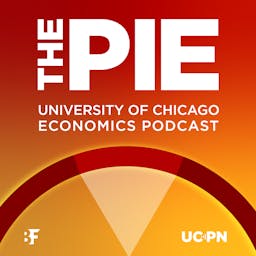

The Pie: An Economics Podcast
Becker Friedman Institute at UChicago
Economists are always talking about The Pie – how it grows and shrinks, how it’s sliced, and who gets the biggest shares. Join host Tess Vigeland as she talks with leading economists from the University of Chicago about their cutting-edge research and key events of the day. Hear how the economic pie is at the heart of issues like the aftermath of a global pandemic, jobs, energy policy, and more.
Episodes
Mentioned books

Jul 11, 2023 • 20min
Social Distancing in 2023: The Economic Costs of Lingering COVID Fears
Many, if not most, citizens of working age have gone back to their jobs in the three-plus years since the start of the pandemic – but not everybody has. Part of the reason is a lingering fear about workplace safety. Chicago Booth’s Steven Davis has new research showing the effect of these fears on the overall economy.

Jun 27, 2023 • 25min
Harvesting Green Investments: The Promise and Perils of ESG
In the stock market, we all want to do well, but for some investors it’s also important to do good. In this episode, Chicago Booth’s Lubos Pastor joins to discuss his research on sustainable investing and what two recent studies tell us about the returns on “green” vs “brown” assets.

Jun 6, 2023 • 24min
How Debt Relief Raised Debts: The Untold Story of the Student Loan Moratorium
Did borrowers and the American economy benefit from the federal government’s 2020 student debt moratorium? The picture is complicated according to new research from UChicago Economics’ Michael Dinerstein and Chicago Booth’s Constantine Yannelis. They join this week to share their surprising findings.

May 30, 2023 • 19min
Quid Pro Vote: The Politics and Economics of Vote-Buying
Vote-buying, or influencing voters’ decisions through favors or gifts, is pervasive in areas such as Latin America, Africa, and Southeast Asia. UC Berkeley’s Frederico Finan, the TC Liu Distinguished Visitor at BFI, discusses his work studying how vote-buying unfolds on the ground in Paraguay. Finan describes how norms of reciprocity drive voters to opt for politicians who have treated them favorably in the past, and offers advice for how policymakers might disrupt this process to combat election fraud.

May 3, 2023 • 24min
Misperceived Truths: Global Support for Women in the Workplace is More Than You Might Think
Around the world, people underestimate support for basic women's rights. In new research, UChicago Economics' Leonardo Bursztyn documents these misperceptions and shows how they restrict women's progress. Aligning people's perceived and actual views, he says, can help promote women's full participation in the labor force.

Apr 18, 2023 • 20min
Inflation: The Good, The Bad, and the Baffling
Nobody ever wants to pay more for anything, especially when prices rise drastically – but can inflationary episodes be good for the economy? Harris Policy’s Carolin Pflueger joins The Pie to discuss different types of inflation, how they affect the economy, and what her research tells us about monetary policy in the world of newly rising prices.

Apr 4, 2023 • 27min
Sometimes Bigger IS Better: The Case for Bringing Rural Healthcare to Urban Hospitals
When rural patients need care that local medical facilities can’t provide, what’s the best way to ensure they get the care they need? Chicago Booth's Jonathan Dingel and Harris Policy's Joshua Gottlieb explore how larger cities and rural areas trade medical services, and challenge assumptions about the best ways to improve both access and care.

Mar 21, 2023 • 29min
Social Media Algorithms: How You’re Curating a Biased News Feed
Social media behaviors, moving at an ever faster pace, may not reflect what users really want, according to new research from economists Sendhil Mullainathan (Chicago Booth) and Amanda Agan (Rutgers University). They join The Pie to discuss how algorithms feed off our lizard brains to magnify biases.

Mar 7, 2023 • 25min
Evaluating US Healthcare 3 Years after Lockdown
At the third anniversary of COVID-19 lockdowns, this episode takes a look at ongoing healthcare market failures and the pandemic’s role in making them plain. Katherine Baicker, healthcare economist and newly appointed Provost of the University of Chicago, joins to take stock of the US healthcare system and discuss the challenges that remain.

Feb 21, 2023 • 28min
Scavenging for Answers: The Human Toll of Vulture Population Collapse
What can vultures and economics tell us about the cost of losing a keystone species? New research from environmental economist Eyal Frank of the Harris School of Public Policy explores the social and economic cost in India, where a plummeting population of vultures may serve as a warning for the future.


